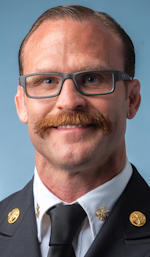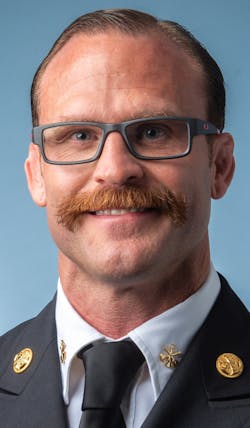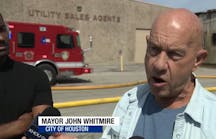As we start the new year, instead of giving you an article to just read, I would like to provide a list of questions for you to ponder and reflect on. Why? Because we’re so caught up in our everyday lives, both personally and professionally, that we often forget to reflect on what we’re doing well and what we’re not doing so well.
In this list, I provide a range of questions geared toward personnel of all ranks and all responsibility levels. Again, you’re asking why. Because we are all on the same team in an organization to provide the best service to our citizens while also providing a great work environment for our people. Some of these questions will make you take a hard look at yourself. But without reflection, we don’t learn about ourselves. So please, get ready to invest the time necessary to be honest with yourself.
Questions for reflection
1. Are you an innovator in your chosen field?
2. Do you enjoy the work you do?
3. Why do you come to work every day?
4. Do you present a positive attitude to your subordinates?
5. Do you present a positive attitude to your supervisors?
6. Are you honest with people or do you tell them what you want them to hear?
7. Do you speak positively about other people?
8. Do you spread rumors?
9. When you hear a rumor, do you go to the source?
10. When someone is going through a challenge in their lives, how do you treat that person?
11. When you train or work with your subordinates, do you show respect to them?
12. Does your uniform and appearance present that of a professional?
13. Do you live by the words you speak?
14. Do you expect the same from yourself as you do from your coworkers?
15. Is your skillset high enough that you would want to be on the team that rescues you?
16. Did you check your SCBA today?
17. Do you do this every day?
18. Is it full or just to the minimum required?
19. Do you know what your air management is relating to the cylinders that you use?
20. Is your gear in appropriate working condition?
21. Is your department’s gear quality a top priority?
22. Do you have a cancer prevention program in place?
23. Did you check your apparatus today?
24. Do you know where every piece of equipment is?
25. Do you know your policies inside and out?
26. Do you know where to find your policies?
27. Do you treat others with respect?
28. Do you see the fire service as a job, a profession, or both?
29. What did you learn today?
30. Did you bring stress home from work today?
31. Did it affect your family?
32. Do you use mental health services?
33. Does your department have a mental health plan in place for the members?
34. Do you talk negatively behind people’s backs?
35. Do you lead with the head, heart and hands mentality?
36. Do you yell at someone when they don’t perform well?
37. Do you coach someone when they don’t perform well?
38. Are you on the top of your game?
39. Are your subordinates on the top of their game?
40. Do you aspire to promote in your organization?
41. If so, what are you doing to make it happen?
42. Do you expect your organization to provide everything you need for promotion?
43. Do you take fire service classes on your own time?
44. Do you take college courses on your own time?
45. Do you take classes on nights and weekends?
46. Are you dedicating too much time to your profession?
47. Are you not dedicating enough time to your profession?
48. Are you spending enough time with your family?
49. Can you develop a better work/life balance?
50. How would you do so?
51. Do you dedicate time to your health and wellness?
52. Do you exercise?
53. Do you expect your coworkers to be in good functional shape?
54. What bad habits do you have?
55. What good habits do you have?
56. What is your biggest pet peeve as a leader?
57. Does this pet peeve bother you because you’re not current with the times?
58. How could you change your way of thinking so the pet peeve doesn’t bother you?
59. Are you open to learning from your new members?
60. Are you open to learning from subordinates?
61. Are you open to learn from someone who you may not work well with?
62. Do you see the value in active listening?
63. When someone is telling you a story, do you pay attention or do you play with your phone or computer and act like your listening?
64. When someone is talking to you about something that is important to them, are you listening or just waiting to respond?
65. Do you utilize collective learning (learning from all ranks and other organizations) in your leadership style?
66. Do you take criticism well?
67. Do you get defensive when people criticize your work?
68. Do you get defensive when people criticize you personally?
69. How do you overcome this, or does it get the best of you and affect your work and personal life?
70. What is the last book you read?
71. What did you learn from it?
72. How will you institute this new concept you learned into your daily life?
73. Do you care that people know your rank?
74. Why or why not?
75. Are you a T-shirt firefighter (you want the fire department T-shirt but not the responsibilities)?
76. Do you train every day you are on shift?
77. Are you open to learning new concepts besides the way you’ve always done it?
78. Would you wear a different style helmet that is proven more functional than our helmets?
79. Why or why not?
80. Is functionality or tradition more important to you?
81. Do you lead with a smile on your face?
82. What is the last professional conference you attended?
83. Did you go there to learn?
84. What did you learn?
85. Did you attend every class possible to learn aggressively?
86. Is your attitude contagious to your crew whether positive or negative?
87. Do you feel positivity breeds positivity?
88. Do you feel that one person on a crew can change the dynamic both positive or negative?
89. If it is negative, how could you help this crewmember change their thoughts to have a better impact on the crew?
90. Are you aware of the increasing rate of suicides in this profession?
91. Are you aware of the increasing mental health issues in this profession?
92. Do you know how many line-of-duty deaths (LODDs) we had in 2018?
93. How many NIOSH reports did you read in 2018 to learn from the sacrifices of the fallen?
94. Do you think an LODD is not possible in your organization?
95. What can you do to prevent an LODD?
96. Do you take ownership of your organization to help make improvements?
97. In what ways?
98. What specific changes will you make from the answers to these questions that will make you a better professional and individual in 2019?
99. Do you now understand the importance of reflection?
Be honest
I hope these questions made you think, but more importantly, I hope you were honest with yourself when answering them. I write these articles from the heart, so when I wrote this, I was asking myself these questions to offer myself an opportunity to self-reflect as well. It is important to remember no matter what position we are in or our rank, we are constantly evolving or, unfortunately, remaining stagnant. Self-reflection is one of the key ways to identify growth or lack thereof, but it only works if the person doing the self-reflection invests time to do so and is honest.
When I answered these questions, I found numerous areas where I need to improve, but now that I know, I’m ready to go. If you were honest with yourself, you learned the same. If not, you will keep going along, missing key ingredients to the leadership recipe we are all trying to perfect. The trick is to remember that the recipe is never perfect. It’s always evolving, and the ingredients are always changing.
I close with a wish of good luck on your journey in 2019. Be better next year at this time than you are right now both personally and professionally. If you’re not, how do you expect the people you are leading to be? No more questions.

Dr. David Griffin
Dr. David Griffin is the assistant chief of administration in Charleston, SC. He was the operator of the first-due engine on June 18, 2007, when nine of his fellow firefighters perished. Griffin has come through the ranks in operations in every uniformed position, from firefighter to battalion chief and shift commander to his current position, during his 19-year career in Charleston. He has a bachelor's degree in education from The Citadel, a master's degree in executive fire service leadership, and a doctorate of education in organizational leadership and development. Griffin is the author of "In Honor of The Charleston 9: A Study of Change Following Tragedy," among three other books. He is an international speaker and instructor, a certified Chief Fire Officer and Chief Training Officer with The Center for Public Safety Excellence, an IFSAC/Pro Board-certified Fire Officer IV and a graduate of the Executive Fire Officer Program from the National Fire Academy. He is a graduate of Harvard University's Kennedy School of Executive Education program: Senior Executives in State and Local Government and of the Psychology of Leadership program at Cornell University's SC Johnson College of Business. Griffin is the owner of On A Mission, LLC, at drdavidgriffin.com.






